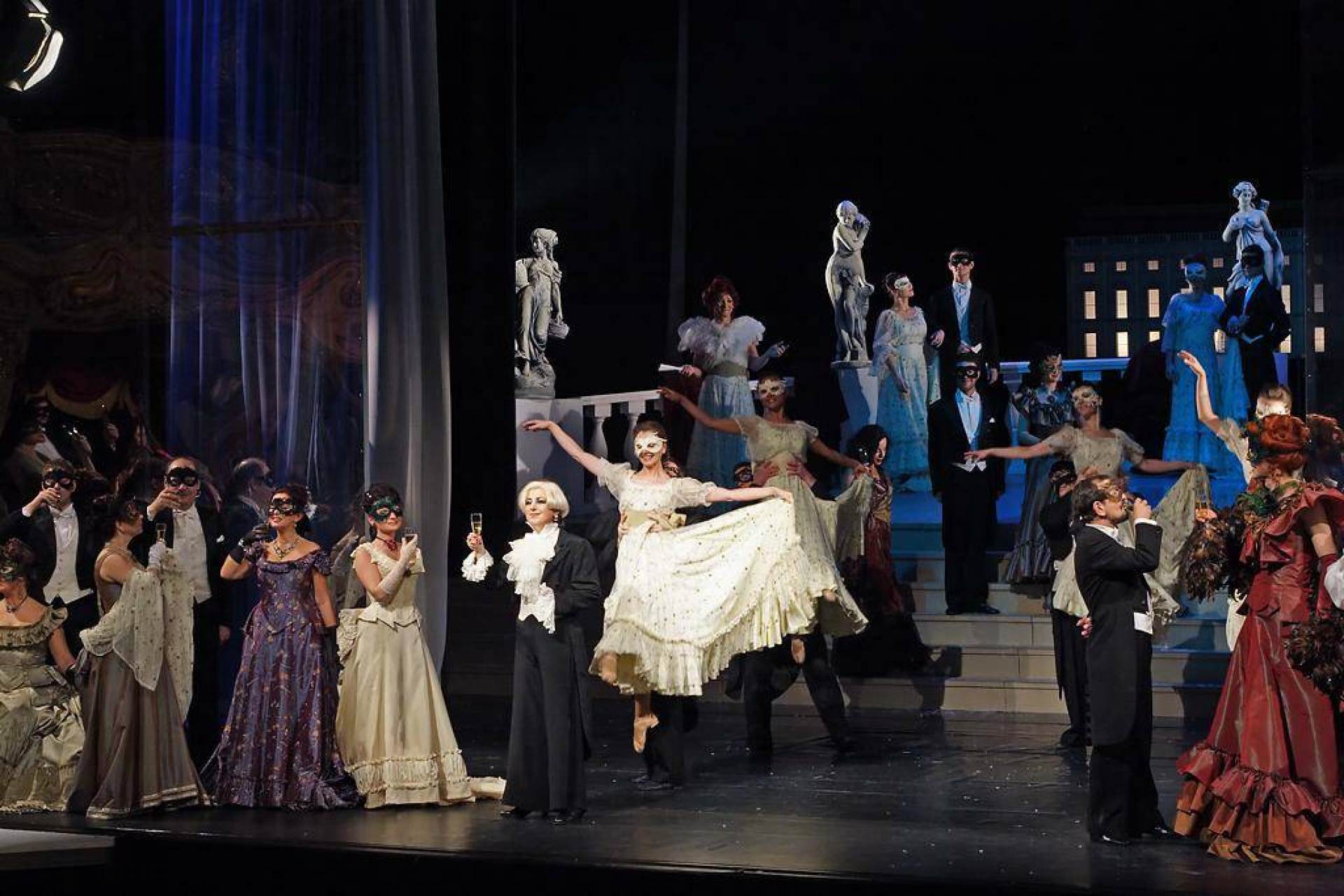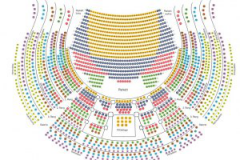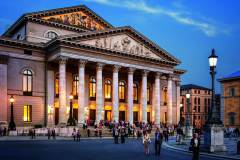The Bat
Mo | Tu | We | Th | Fr | Sa | Su |
Operetta in three acts (1874)
recommended from 10 years and older
Coproduction with the De Nationale Opera Amsterdam
In German. With German and English supertitles. New Production.
Barrie Kosky affords the “operetta of all operettas” a new look and focuses on its morbid side. The scene is Vienna, city of the golden operetta era, where Die Fledermaus celebrated its world premiere at the Theater an der Wien in 1874. The revenge of the bat becomes a nightmare for Gabriel von Eisenstein and many others. A society, an entire city dances towards the abyss. To take revenge on his friend Eisenstein, Dr Falke, alias the bat, orchestrates a misunderstanding with Prince Orlofsky. A marquis and a chevalier, a countess and budding artists meet here for a raucous party. Glasses clink, relationships are strained, there is loving, lying and dancing. They party ‘til the cows come home, always believing: “Happy are those who forget ...”
FIRST ACT
The more bourgeois, the more unfulfilled: Rosalinde von Eisenstein, a higher-class Viennese woman, settled in marriage to the dull-witted Gabriel von Eisenstein, fights against the advances of her premarital lover, the tenor Alfred. Adele, the Eisensteins' chambermaid, although generally less talented in the service profession, longs for a career in show business, which her sister Ida, already a guest in higher circles, is supposed to help her achieve. Adele receives a letter from Ida inviting her to an excessive party at Prince Orlofsky's, who is legendary in Vienna. Adele fabricates an illness of her aunt in order to be released from the Eisensteins' service for one evening. They will all meet there later – dressed in identity-preserving costumes, of course. Gabriel von Eisenstein is particularly craving a night like this, as he has recently been condemned to a short prison sentence for his verbally and physically abusive behavior towards the judiciary. He still has one night left before going to prison. His lawyer, Dr. Blind, was able to negotiate this short reprieve in court. Dr. Falke, on the other hand, a close friend of Eisenstein's, has been waiting a long time for this moment. He plans to take revenge on Eisenstein – Eisenstein had once exposed his friend to Viennese society by dressing him up in a bat costume after a night of drinking and letting him stroll through Vienna. Therefore Falke invites Eisenstein to join Orlofsky – options for extramarital contacts included, of course. Eisenstein is easily convinced, as he is well practiced at this; a luxurious pocket watch has often served him as a temptation for younger ladies on his nightly excursions. Gabriel says goodbye to his wife on his way to prison. She is of course also invited to Orlofsky as part of Falke's revenge plan. Shortly thereafter, Rosalinde is in turn confronted by Alfred, who once again tries to seduce her with his vocal-oral talents. Both are interrupted by the prison director Frank. He is looking for the convicted husband to escort him to prison. The only logical consequence is that Alfred has to quickly pretend to be Eisenstein and is taken to prison in his place, lest the tête-à-tête would be made public. In the end, everyone is on their way to Orlofsky's party, even the pedantic prison director is dragged there.
SECOND ACT
Things are wild in the House of Orlofsky. Whoever is here is at best not bourgeois, or willingly discards any etiquette of such a world at the checkroom. This evening will be a Dionysian celebration – ecstasy by definition. Adele, wearing a dress of Rosalinde, meets her sister Ida, who is confused by the supposed invitation by letter – also written by the revenge-hungry Falke – but is warmly delighted by her sister's arrival and wants to introduce her to society as an actress called Olga. The famous and notorious Prince Orlofsky, meanwhile, is almost under-tensed from all the partying and commands that he be amused. Falke proposes the performance of an improvised play – the title is The Revenge of the Bat. Thus the entanglement arranged by Falke finally progresses, and as a matter of course, so does the level of ecstasy of all the guests; Eisenstein arrives, whom Falke introduces as Marquis Renard. The prison governor also appears under his false name Chevalier Chagrin. The highlight is the appearance of a much-heralded star: the Hungarian countess. This masked countess is none other than Rosalinde, who is horrified that her husband has lied to her and is unabashedly making love to the chambermaid, whom he believes to be an artist, and later to her herself in costume. In the process, she manages to steal his pocket watch. The party is still in full swing in the early hours of the morning, but Eisenstein finally has to say goodbye and makes his way to prison.
THIRD ACT
The alcohol level in this prison is dangerously high. The prison guard Frosch meets the very drunk prison director, who can no the longer see clearly. One by one, everyone arrives. Ida and Adele continue to work on the artist career that is still pending and ask Frank for the help he promised Olga as Chevalier Chagrin in an intimate moment. Above all, he must put in a good word for her with Rosalinde von Eisenstein, as Olga has stolen her dress. He agrees, but the next moment he realizes that Marquis Renard is at the door. To ensure that Ida and Adele remain undiscovered, they are taken into hiding. Eisenstein realizes that, firstly, Chevalier Chagrin is in fact the prison governor and, secondly, Eisenstein has already been imprisoned. He begins to rage when he realizes how Alfred could have been mistaken. He feels cheated by Rosalinde and thirsts for revenge. Rosalinde, who has now arrived, tries to talk her way out of the affair with Alfred. At this point, they all feel betrayed by each other and are furious. An argument ensues between the Eisensteins and reproaches are hurled. Rosalinde then holds his watch under his face. Before the situation escalates, Falke appears with Orlofsky and his entourage and sets Eisenstein straight. This is how the bat gets revenge! The masquerade is over. Everyone is exposed and would have to admit to their actions if it wasn't for the champagne. After all, the blame can be shifted onto it. Only one thing is still missing: the hangover ...
Program and cast
Duration approx. 3 hours
Conductor: Zubin Mehta
Director: Barrie Kosky
Choreographer: Otto Pichler
Stage Designer: Rebecca Ringst
Costume Designer: Klaus Bruns
Lighting: Joachim Klein
Chorus: Christoph Heil
Dramaturge: Christopher Warmuth
Gabriel von Eisenstein: Rolando Villazón
Rosalinde: Rachel Willis-Sørensen
Frank: Martin Winkler
Prinz Orlofsky: John Holiday
Alfred: Pavol Breslik
Dr. Falke: Konstantin Krimmel
Dr. Blind: Kevin Conners
Adele: Mirjam Mesak
Ida: Miriam Neumaier
Frosch I: Max Pollak
Frosch II: Franz Josef Strohmeier
Bayerisches Staatsorchester
Chorus of the Bayerische Staatsoper
National Theatre Munich
The National Theatre Munich (German: Nationaltheater München) is an opera house in Max-Joseph-Platz in Munich, Germany. It is the home of the Bavarian State Opera and the Bayerisches Staatsballett(Bavarian State Ballet).
The Bavarian State Opera also performs in the Prinzregententheater, which opened in 1901 and, like the Bayreuth Festspielhaus, is built to Richard Wagner's specifications, and in the Cuvilliés Theatre at the Residenz, constructed in 1751–1753 and described by Thierry Beauvert as "a Rococo gem".
The Nationaltheater is very easy to get to both by car and by MVV public transportation.
By MVV public transportation
S-Bahn: S 1 - 8 Marienplatz
U-Bahn: U 3, 6 Marienplatz, U 3 - 6 Odeonsplatz
Bus: 52, 131 Marienplatz, 100 Odeonsplatz
Straßenbahn: 19 Nationaltheater
On the day of the performance, holders of regular tickets are entitled to use public transport provided by the Münchner Verkehrsverbund (MVV). This service starts at 3 pm respectively three hours before the performance commences and ends with the closing hour of the MVV.
By Car
Take the Altstadt-Ring to Maximilianstraße.
Parking garage Max-Joseph-Platz: open Monday to Sunday from 6:00 A.M. to 2:00 A.M.
You can take advantage of the special theatre parking fee of Euro 10,- from 6:00 P.M. to 8:00 A.M. by presenting your admission tickets.

 EN
EN DE
DE IT
IT FR
FR ES
ES RU
RU JP
JP RO
RO
 Seating plan
Seating plan 